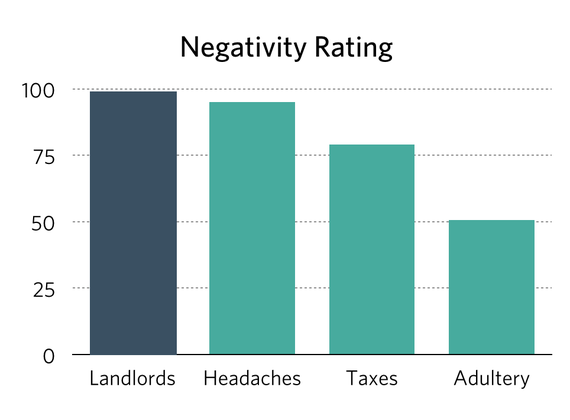When was the last time you had a landlord you truly loved? If you're like most people, the answer is never. But here's the dirty little secret for anyone who's ever had a big list of complaints about their landlord: Your landlord probably had an equally long list of complaints about you.
The typical landlord-tenant relationship is fraught with tension. Disagreements abound over every aspect of the rental process, from payments to repairs, leases to drop-ins. On What Does the Internet Think, a site that uses linguistic analysis to determine how positively something is viewed online, landlords have a negativity rating of 98.9 percent -- higher than headaches (95 percent), taxes (79 percent) and even adultery (just 51 percent!).

And tenants aren't viewed so positively either. At Castle, our property management startup, we surveyed hundreds of landlords, and their top complaint about landlording, by a margin of over 2:1, was some variation of "bad tenants."
Just some of the many synonyms for "bad tenants" we received.
But most landlords aren't bad people, and most tenants aren't either. So how does this happen? Is there something about property rental that turns normal people into assholes?
Of course not. As it turns out, behind most supposedly "bad" tenants (and bad landlords) lies a more nuanced story. When we dug further into each report of a bad tenant, we found that most of the conflicts could be traced to a breakdown in communication.
- a tenant who was repeatedly late with rent;
- a tenant who kept the property extremely messy;
- a tenant who didn't notify her landlord about a leaking toilet, which resulted in a giant water bill.
- The late payer always had enough money to pay his rent; he just forgot sometimes.
- The messy tenant viewed the property as "his" house, and didn't understand that the landlord expected him to keep it clean.
- And the tenant with the leaky toilet was actually trying to be nice -- she didn't notify her landlord because she felt bad about bothering him!
In each of these cases, the bad behavior at issue was really caused by poor communication.
Think about your last rental: Did you know how far in advance your landlord was supposed to notify you if he wanted to visit the property? Did you know how much the late fee was if you missed a rent payment? Did you know what the process was for notifying your landlord if the property needed a repair? When landlords and tenants aren't on the same page about these kinds of issues, the stage is set for conflict.
Landlording is a strange business. Tenants and landlords share one of the most intimate things two people can share: their home. Of course, not every landlord-tenant dispute is a result of poor communication; there are certainly situations where a tenant knowingly breaks the rules, or doesn't come up with the rent. But so much stress, anxiety and conflict between landlords and tenants can be avoided when both parties lay out their expectations explicitly at the beginning of the relationship.